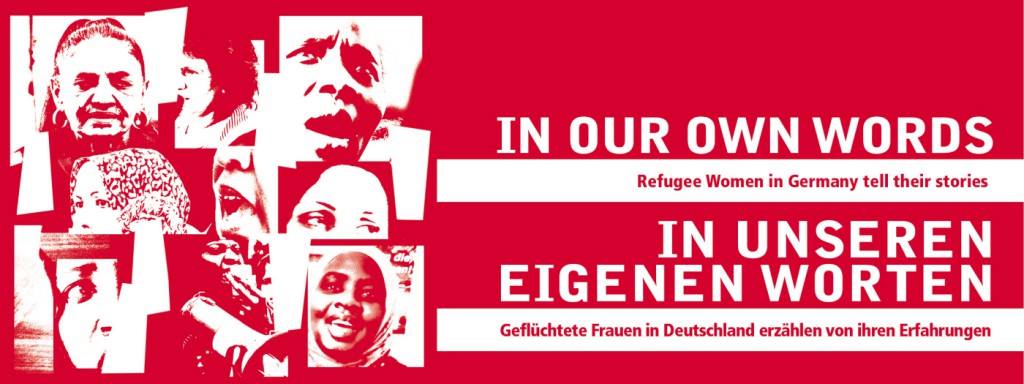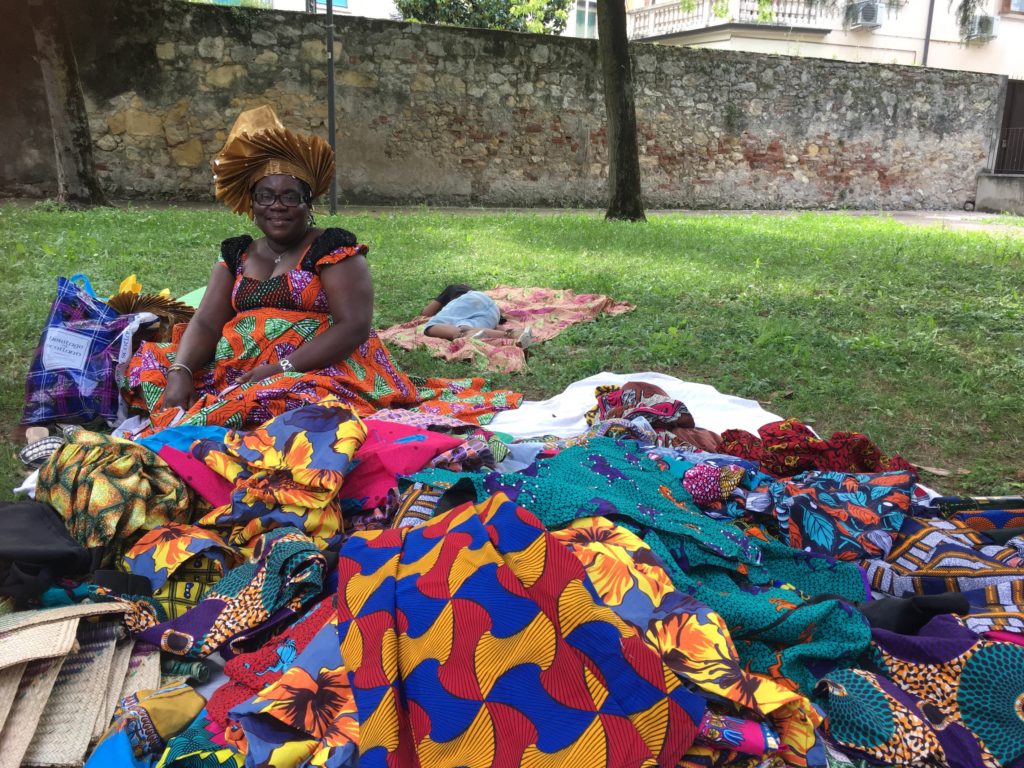Book review of “In our own words – Refugee Women in Germany tell their stories” (International Women* Space, 2015)
by Juliana da Penha
In Book Review we write about books made by and about migrant women experiences. If you want to write us a book review, get in touch at migrantwomenpress@gmail.com
What stories do we know about refugee women? Suppose we had a quick look at the mainstream media coverage about migration and asylum now. Is easy to realize that the news about these women doesn’t give us a sense of their individual experiences. We have the information about the countries they came from, the numbers arriving, the difficulties they might face, and the policies created to prevent them from arriving. But who are these women? Why did they flee? What are their stories? Their dreams and feelings?
“In our own words – Refugee Women in Germany tell their stories” was edited by International Women Space and released on 25th of November 2015 in Berlin, on the “International Day for the Elimination of Violence Against Women” then reprinted in 2017. This book documents the stories and struggles of refugee women living in Germany.
The International Women Space is a feminist, anti-racist political group organized by migrant and refugee women and non-migrant women in Berlin. Together they are fighting against discriminatory policies and practices which oppress migrant and refugee women in Germany. Among their various actions, this book is a collection of stories of women who, for different reasons, left their countries to find a safe space to live. Some of them anonymously tell their stories, the reasons behind why they moved and how is to live treated as a second-class citizen. These women are forced, no matter how to be courageous and find the strength to survive in a system that refuses to accept their existence.

In this book, you can meet Radmila Anic story, a Serbian Roma woman who for 10 years led a Roma organization for single mothers in her country before being blackmailed by the local mafia and the police and forced to leave for her safety. You also meet Bintou Bojan, a victim of female genital mutilation who fled the Gambia at 17 years old to seek asylum in Germany and now raise other women voices to fight against FGM. You get to know about an Afghan woman who once was a candidate for a seat in the Afghan Parliament and now is an asylum seeker in Germany due to political problems. You can read an interview with the human rights activist Napuli Langa, a Sudanese woman who escaped persecution and torture in Sudan due to her activism. She explains the importance of self-organized actions around the refugee movement in Berlin to fight against harsh immigration policies and inhuman living conditions.
These are some of the 10 testimonials collected inside 256 pages with real-life storytelling, art, activism, and music. There are two songs by two young rappers from Afghanistan, Paradise and Diverse from 143 Band. They left their country out of fear as they were facing death threats for singing and not conforming to the gender roles of women in that society.
Many aspects of this book caught our attention, mainly because it brings a different perspective from what we used to read about refugee women. Also, using testimonial literature, a tradition in Latin American literature to give voice to the voiceless, was created by migrant and refugee women themselves.
Another aspect is that the book exposes that refugee women are not a homogenous group; they might be trapped in the same harsh immigration and asylum policies, but their stories are unique; furthermore, the reasons they flew are different. “In our own words” brings us first-person narratives and real-life experiences about struggles and resilience.

This book has another urgent mission: register the stories of refugee women who fought for their rights until the end. In an interview, Sista Mimi, who passed away in 2014, tells her journey from Kenya to Germany and all she went through fighting for her right to stay in the country. She makes an interesting reflection: “I’ve still never really been seen as part of this society”.
There is also an appeal made by the Kurdish Women’s Organization after the murder of three Kurdish women’s rights activists in 2014. They demand “support for a dialogue about peace, democracy and the recognition of the rights of all peoples within Turkey and the entire Middle East”.
In the poem “To them we are nothing”, Maria raises her voice and claim: “I don’t know. We don’t know why we are treated like that. Because we are people. We are not animals”.
All the texts are available in English, German, and some of them are in the native languages of the authors. Visual art is another important feature of the book, balancing photographs with awesome illustrations.

“In our own words” is an important document about the experiences of refugee women in Germany. Is not only an essential reference for researchers in the field of Gender and Migration, for journalists writing about the experiences of women seeking asylum, politicians and activists challenging harsh immigration policies and everyone who wants to understand more about our society. It is a historical register of the experiences of women who dare to fight for their existence in a system that constantly tries to erase them.
You can order the book here: https://iwspace.de/in-our-own-words/#order



